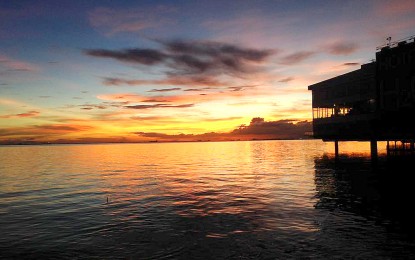
DESALINATION. The country cannot turn its seawater for irrigation and human consumption as the general public cannot afford it yet. Maynilad is in its preliminary stage of conducting studies to tap seawater in the future. (PNA file photo)
MANILA -- The Metropolitan Waterworks and Sewerage System (MWSS) has been working on ways to increase the supply of water in response to the woes of customers, who experience crises every year, particularly during the dry season.
However, as brilliant as it may seem, desalination cannot be among the possible options to solve it.
MWSS chief regulator Patrick Ty said they have been considering the conduct studies to know whether the process of removing salt from seawater to make it usable for irrigation and/or human consumption is plausible.
“The majority of our people are having problems paying their monthly bills and the cost of living here. We are not at that stage yet that we can afford to pay for desalination. It is very expensive,” Ty said on Monday during a forum on Water Technology in Makati City.
The MWSS chief regulator said desalination might balance the ratio of low water supply to the high consumer demand but it will not be affordable for the average and low earner demographic.
“We have already computed it. The cost right now, for example, the selling price of water is around PHP40, the cost of treating it for desalination is already around PHP90. So it’s more than double,” Ty added.
Since the backlash it got from customers due to the water shortage, the MWSS has now reactivated a lot of deep wells and fast-tracked the Cardona Water Treatment Plant to catch up with the growing population in the metropolis.
“The general solution will be the completion of the Kaliwa Dam project but it faces delay due to road right of way issues. There will still be a water crisis next year but it will not be as bad as before,” Ty said.
Ty added that they are eyeing the reuse of greywater, or all wastewater generated in households or office buildings from streams without fecal contamination, for its customers.
The Israel Chamber of Commerce of the Philippines (ICCP), on the other hand, has expressed interest in sharing Israel’s experience in finding innovative ways to manage water supply and make it available to everyone, even with very limited resources.
Sagiv Massad, ICCP director for Technology and Cyber Security Business Profiles, invited start-up entrepreneurs and business groups for the Water Technology and Environmental Control (WATEC) in Israel on November 19-20 this year.
“We hope to help with the Philippines in the water crisis, we invite you to attend WATEC 2019 so those who will be present there will share to others the know-how,” Massad said.
Several features of the WATEC 2019 will focus on water governance and regulation; integrated water resources management; flood perception, reservoirs; reuse of treated effluents; brackish water desalination; development of the national and regional infrastructure; and water conservation, education, and campaigns.
More details on the event are available at https://watec-israel.com. (PNA)
